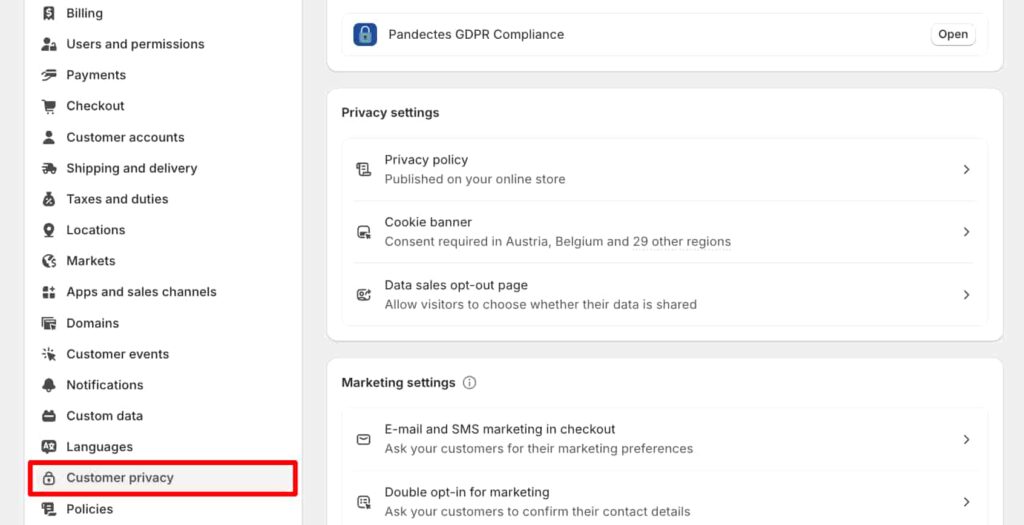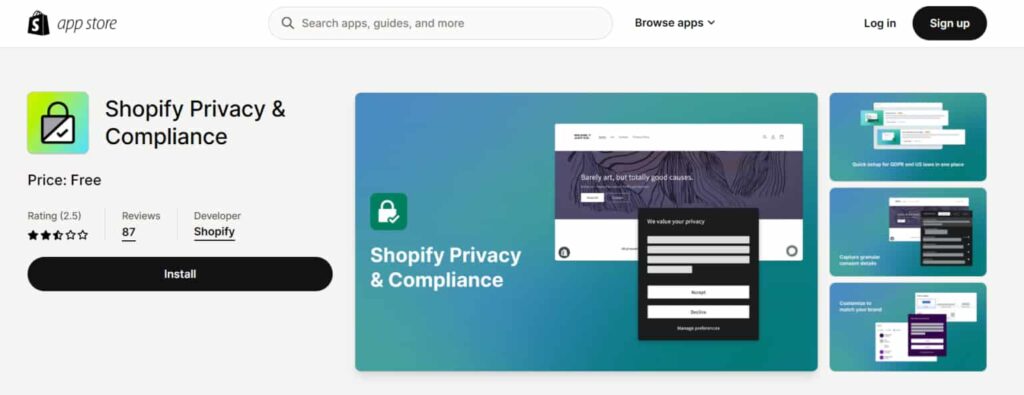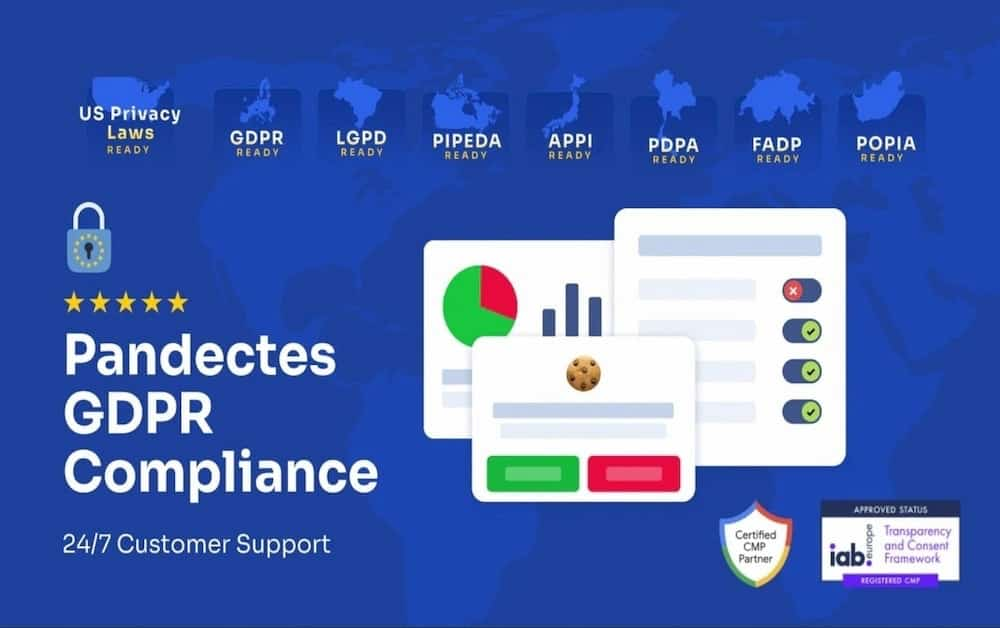Understanding Data Protection Laws
Data protection laws are essential regulations that govern how personal data is collected, stored, and used. These laws vary across different countries and regions but share a common goal: to protect individual’s rights to privacy and control over their personal information. In the European Union, the General Data Protection Regulation (GDPR) stands as the cornerstone of data protection laws, setting stringent requirements for how personal data should be handled. Meanwhile, in the United States, the California Consumer Privacy Act (CCPA) plays a similar role, providing robust protections for consumers’ personal data.
- Free 7-day trial
- No setup fees
- Cancel anytime
For Shopify merchants, compliance with these applicable data protection laws is not just a legal obligation but a critical component of building and maintaining customer trust. Ensuring that your Shopify store adheres to the GDPR, CCPA, and other relevant laws means safeguarding your customers’ personal data and respecting their privacy rights.
Shopify’s Role in Data Protection
Shopify is committed to helping merchants navigate the complex landscape of data protection laws. By offering a suite of tools and resources, Shopify ensures that merchants can comply with applicable data protection laws effectively. Shopify’s data protection policies and procedures are meticulously designed to secure the processing of personal data.
Moreover, Shopify empowers merchants to manage customer data requests efficiently for their business. Whether it’s accessing, correcting, or deleting personal data, Shopify provides the necessary functionalities to handle these requests in compliance with GDPR and CCPA requirements. Additionally, features like cookie banners and consent management tools are integrated into the platform, making it easier for merchants to obtain and manage customer consent, a crucial aspect of data protection compliance.

Shopify GDPR & Privacy Key Updates in 2024: What Merchants Need to Know
As privacy regulations continue to evolve globally, Shopify has introduced several significant updates throughout 2024 to help Shopify stores stay compliant with data privacy laws such as GDPR, CCPA, and CPRA, particularly in managing data processing practices. These updates not only make it easier for merchants to manage their store’s privacy settings but also enhance customer trust. Below is a breakdown of the key updates that every Shopify merchant needs to know, listed in chronological order.
Merchant Obligations
Under data protection laws such as the GDPR and CCPA, merchants have several critical obligations to fulfill. These include:
Providing Clear and Transparent Information: Merchants must inform customers about how their data is collected and used in a clear and understandable manner.
Obtaining Explicit Consent: Before collecting and processing personal data, merchants need to obtain explicit consent from customers.
Implementing Robust Data Security Measures: Protecting personal data requires robust security measures, including encryption and access controls.
Responding to Customer Data Requests: Merchants must respond to customer requests to access, correct, or delete their personal data promptly and efficiently.
Ensuring Third-Party Compliance: Any third-party service providers used by merchants must also comply with applicable data protection laws.
Managing International Data Transfers: Merchants must adhere to procedures and legal compliance associated with transferring personal data across various countries, ensuring they meet the obligations related to data privacy for regions like the EEA, UK, and Switzerland.
Additionally, merchants must ensure that their Shopify store’s privacy policy is up-to-date and compliant with applicable data protection laws. This policy should provide clear information about data collection and usage practices, helping to build trust with customers. Of course, this is valid for visitors from any location.
Introducing the Customer Privacy Settings in Shopify Admin
In January 2024, Shopify launched the Customer Privacy Settings section within Shopify Admin, consolidating privacy management into one place.

This update allows merchants to:
Configure privacy settings of their store for different regions.
Set up and update their Shopify store’s privacy policy to ensure compliance with data privacy laws like CCPA and GDPR.
Add a cookie banner, either a default one or a powerful banner such as Pandectes GDPR Compliance.
Enable data sale opt-outs.
View customer data storage information.
This update incorporated features from the now-discontinued Shopify Privacy & Compliance app, which was removed on March 1, 2024, from the Shopify app store. By consolidating privacy tools, Shopify made it easier for merchants to manage their stores’ privacy settings and comply with evolving regulations.
Although this is a good step for an early-stage store that does not use other apps or services to track its visitors, it is not enough. Merchants that run a production store and use tracking apps and services should use a third-party app to have a complete compliance solution that covers all aspects of compliance with data regulations.
Manage Customer Privacy for Custom Pixels
At the same time, Shopify added the ability to manage customer privacy permissions and data sale settings for custom pixels through the Customer events page.
Merchants can:
Ensure custom pixels only fire when the proper customer permissions are granted.
View and manage customer privacy permissions for app pixels directly from the listing on the Customer events page.
This update integrates custom pixel management with the new Customer Privacy Settings, providing more control over pixel-based tracking.
Customer Privacy API for Hydrogen & Oxygen
In early 2024, Shopify extended the Customer Privacy API to support Hydrogen and Oxygen storefronts, allowing merchants to integrate privacy controls more effectively into their custom-built storefronts. This integration enables consent management across checkout, pixels, and other services, ensuring customer preferences flow through Shopify’s ecosystem for compliance.
Shopify’s Removal of the Native Privacy Banner App
In March 2024, Shopify officially removed its native privacy banner app from the Shopify App Store and integrated basic privacy functionality into Shopify Settings > Customer Privacy. The built-in features provide minimal compliance tools, such as a cookie banner and privacy settings, but merchants using third-party apps, scripts, or analytics tools still need a more robust solution to ensure full GDPR compliance.

For complete compliance, merchants should consider using third-party apps like Pandectes GDPR Compliance, which is one of the most popular GDPR apps for Shopify, with more than 2,000 5-star reviews and offers:
A fully customizable cookie banner.
Integration with Google Consent Mode v2.
Is Google-certified CMP with TCF v2.2 support.
Automated and updated cookie policy.
AI-powered scanner.
Auto-blocker that blocks any tracking technology.
Headless, custom storefront support.
Support for customer data requests (DSARs) with customer account extension.
Many more features & Live chat support
These tools ensure that stores using more complex setups comply with global privacy laws.
- Free 7-day trial
- No setup fees
- Cancel anytime
Expanded Pixel Support for Privacy Settings
In May 2024, Shopify expanded privacy control for app pixels using the Web Pixel API. Merchants can now configure customer privacy permissions and data sale settings for pixels, ensuring that data is only collected when customers have provided consent. This update also enables more detailed event tracking under strict privacy conditions, including compliance with international data transfers and giving merchants insights without violating customer privacy.
Pandectes GDPR Compliance supports web pixel API by providing a way to check the consent event inside any custom pixel.
New Data Sale Opt-Out API
In July 2024, Shopify introduced the Data Sale Opt-Out API to help online store owners comply with U.S. privacy laws such as CCPA and CPRA.
This API allows merchants to:
Set a customer’s data sale or sharing opt-out status.
Query a customer’s opt-out status via the GraphQL Admin API.
This new API provides merchants with greater control over customer data preferences, ensuring they comply with U.S. regulations on data sharing. Pandectes GDPR Compliance app is integrated with Shopify’s Data Sale Opt-Out API, and any website built with Shopify can be fully compliant.
Automated Privacy Settings
Also, in July 2024, Shopify rolled out automated privacy settings, which allow merchants to automatically configure and maintain their store’s privacy settings.
By enabling this feature, merchants can:
Automatically generate and maintain a website privacy policy (this cannot update the cookies used on the store) for their business.
Add and keep a cookie banner synced with Shopify’s latest recommendations (with some basic options).
Add a data sales opt-out page that updates automatically based on compliance changes.
This automation simplifies the process of staying up to date with evolving privacy laws, reducing the administrative burden on merchants.
Hydrogen Privacy Enhancements
In the Hydrogen v2024.7.5 release in September 2024, Shopify introduced additional privacy management utilities for Hydrogen storefronts. Two key utilities—privacyBanner and customerPrivacy—were added to the useAnalytics and useCustomerPrivacy hooks, allowing merchants to manage privacy preferences more effectively on Hydrogen storefronts.
These enhancements ensure that merchants using Hydrogen can maintain strong privacy practices and keep their storefronts compliant with global data protection laws.

Cookie Consent and Data Collection
Obtaining cookie consent and managing data collection are fundamental components of data protection laws and regulations. As a Shopify store owner, you must secure consent from customers before collecting and processing their personal data.
To obtain cookie consent, implement a cookie banner or pop-up that informs customers about the cookies you use and their purposes. Additionally, provide customers with the option to opt-out of cookie collection.
When collecting personal data, ensure compliance with data protection laws by:
Providing customers with clear and conspicuous notice of the personal data you collect.
Disclosing the categories of personal data collected.
Offering customers the option to opt-out of targeted advertising.
Protecting the personal data you collect through robust security measures.
Furthermore, a data controller should be appointed to oversee the collection and processing of personal data. This role is crucial in ensuring that your data handling practices align with applicable privacy laws and regulations, thereby safeguarding customer trust and maintaining compliance.
Data Security and Safety
Data security and safety are paramount in the realm of data protection. Shopify takes this responsibility seriously, implementing a range of measures to safeguard personal data. These measures include:
Encryption: Shopify uses encryption to protect personal data both during transmission and while at rest, ensuring that sensitive information remains secure.
Access Controls: Rigorous access controls are in place to ensure that only authorized personnel can access personal data, thereby minimizing the risk of unauthorized access.
Regular Security Audits: Shopify conducts regular security audits to identify and address potential vulnerabilities, maintaining a high standard of security.
Data Backup and Recovery: A robust data backup and recovery process ensures that personal data is protected and can be restored in the event of a security breach.
Merchants also play a crucial role in maintaining data security. Implementing strong password policies, using secure payment gateways, and regularly updating software and plugins are essential practices for protecting personal data. By taking these steps, merchants can enhance the security and safety of their customers’ personal data, ensuring compliance with data protection laws and fostering customer trust.
Maximizing Privacy Compliance Beyond Shopify’s Built-In Tools
While Shopify has introduced several updates in 2024 to enhance privacy compliance, its built-in tools provide only a basic framework for managing customer data. These tools, such as the cookie banner and privacy policy generator, are a good starting point but fall short when meeting the comprehensive requirements of GDPR, CCPA, CPRA, and other global privacy regulations.
For businesses with more complex operations, third-party analytics, or marketing integrations, Shopify’s default features often leave critical gaps in compliance.
Key Limitations of Shopify’s Privacy Features
Minimal Cookie Management:
The default cookie banner lacks advanced customization and automated updates. It doesn’t offer a detailed breakdown of cookies used on the site, leaving merchants to manually manage compliance with cookie laws across different regions.Limited Data Request Handling:
Shopify allows merchants to respond to customer data requests, but the process can be cumbersome for stores handling high volumes of such requests. Automating this process is crucial for efficiency and compliance, which Shopify’s native tools do not fully support.Inadequate Third-Party Compliance Support:
Many merchants rely on third-party apps and analytics tools, such as Google Analytics, Facebook Pixel, or marketing automation platforms, which require their own layers of compliance. Shopify’s tools do not address the complexities of ensuring third-party services meet privacy laws.Lack of Advanced Consent Management:
Managing consent across regions with varying regulations, like GDPR’s explicit consent requirements or CCPA’s data sale opt-out, is a significant challenge. Shopify’s privacy settings provide basic functionality but lack advanced options like Google Consent Mode integration or robust consent tracking.No Real-Time Updates for Evolving Laws:
Privacy laws are continuously changing, and Shopify’s static features may not keep pace with new requirements. Businesses need dynamic tools that update automatically to remain compliant.
For these reasons, Shopify merchants require a complete compliance solution that goes beyond the platform’s capabilities, ensuring every aspect of their store aligns with the latest global privacy regulations.
Pandectes GDPR Compliance is the ideal solution for Shopify store compliance with data regulations, offering services that enhance transparency in the process of collecting personal information. By addressing user needs, building customer trust, and supporting businesses in maintaining compliant websites, Pandectes ensures that merchants can confidently meet regulatory requirements and foster stronger relationships with their customers.

Why You Need a Complete GDPR Compliance Solution
While Shopify has made strides to enhance privacy controls and compliance tools within its platform, Shopify stores often require more advanced features, particularly if they’re using third-party analytics or marketing tools for collecting personal information and processing user data.
With Pandectes GDPR Compliance, you can ensure that all aspects of your business, from cookies to customer data requests, are managed in line with the latest legal regulations and data privacy laws. Our customizable cookie banner helps your Shopify store comply with privacy regulations and the Shopify Privacy Policy, making it easier to manage collecting personal information and meet legal requirements effectively. Moreover, Google Consent Mode v2, whether through Basic or Advanced implementation, is essential for any business utilizing Google Analytics or other Google services. This integration, supported by Pandectes, has proven invaluable, saving time and resources for thousands of satisfied store owners who have successfully implemented it in their online stores.
Another critical aspect is the continuous changes within websites and the varying cookies triggered by these updates. Pandectes addresses these challenges with its AI-powered cookie scanner, which generates automated, multilingual cookie policy content, ensuring comprehensive compliance for Shopify stores and their businesses. The transparency offered by our services helps determine the location of users and visitors, ensuring the processing of data aligns with the General Data Protection Regulation (GDPR) and other data privacy laws.
Whether you need a fully customizable cookie banner, automated cookie policies, or the ability to manage complex data subject requests, our app is designed to provide peace of mind, keep your website legally compliant, and ensure your Shopify store meets all necessary legal requirements when it comes to collecting personal information and processing data. Pandectes helps maintain compliance with GDPR and other data protection laws, supporting your business in adhering to data privacy standards and building trust with your users.
Final Thoughts
The privacy landscape is constantly changing, and 2024 has brought several critical updates from Shopify to help merchants stay compliant with regulations like GDPR, CCPA, and CPRA. From the new Data Sale Opt-Out API to expanded pixel support and deeper Hydrogen integrations, Shopify is continuously improving its privacy toolkit.
However, as privacy regulations become more complex, third-party tools like Pandectes GDPR Compliance are essential to ensure full compliance, especially for businesses operating across multiple regions. Stay ahead of the curve and ensure your store meets the highest standards of data privacy protection.
Frequently Asked Questions
Does Shopify comply with GDPR?
Shopify provides tools that can help your Shopify store achieve basic compliance with the General Data Protection Regulation (GDPR). However, ensuring full GDPR compliance requires that each Shopify store takes appropriate actions for data processing, user consent, and maintaining a suitable Shopify Privacy Policy by using third-party apps such as Pandectes.
Is Shopify CCPA compliant?
Shopify offers features to support CCPA compliance, but it is the responsibility of individual Shopify stores to ensure their online store meets all requirements. The California Consumer Privacy Act (CCPA) has specific rules regarding data processing, and Shopify provides tools and third-party apps that can assist in managing user requests and maintaining a compliant privacy policy.
Does my Shopify website need a privacy policy?
Yes, your Shopify website needs a privacy policy to comply with GDPR, CCPA, and other applicable data protection laws. A privacy policy is essential for any Shopify store because it informs users about data processing practices, including how personal information is collected, stored, and used.
How long does Shopify keep customer data?
Shopify retains customer data for as long as necessary to fulfill the purposes for which it was collected or as required by applicable law. However, each Shopify store is responsible for defining its data retention policies in line with GDPR compliance and other data protection regulations.




